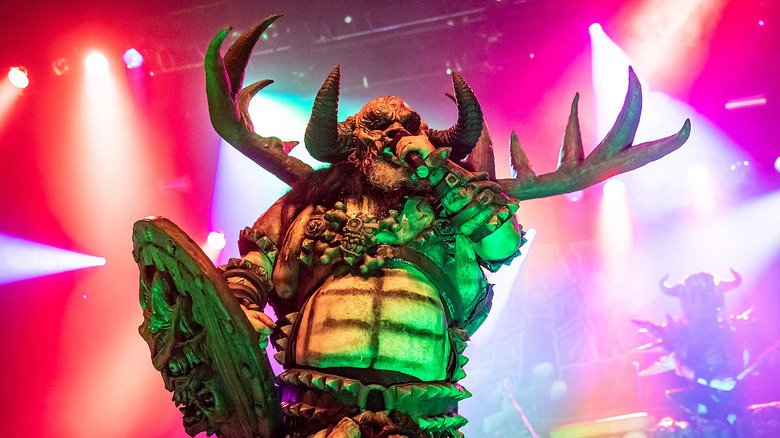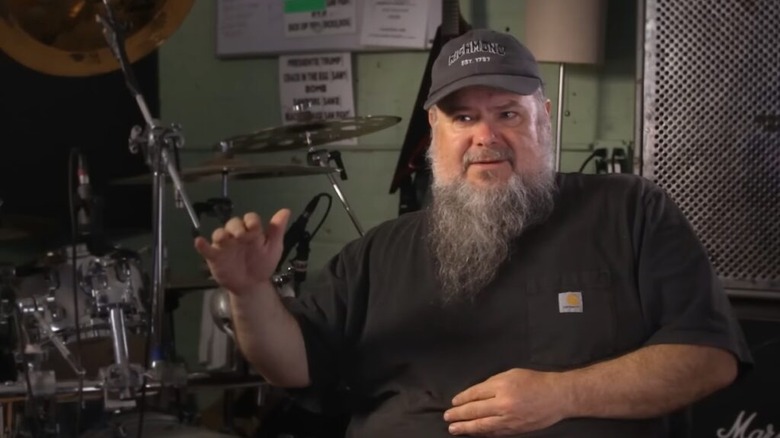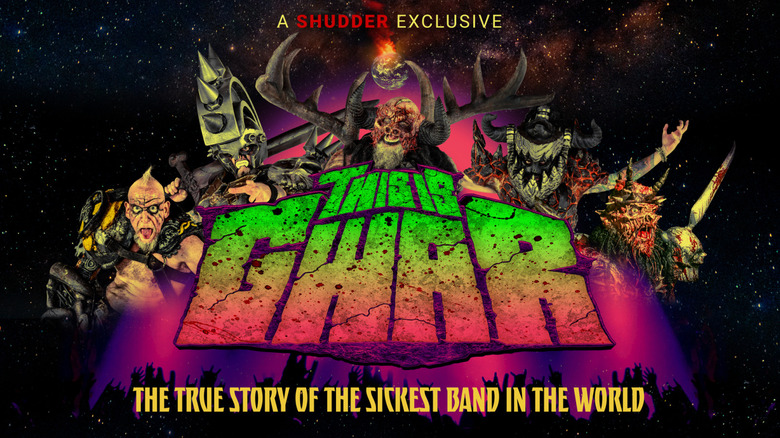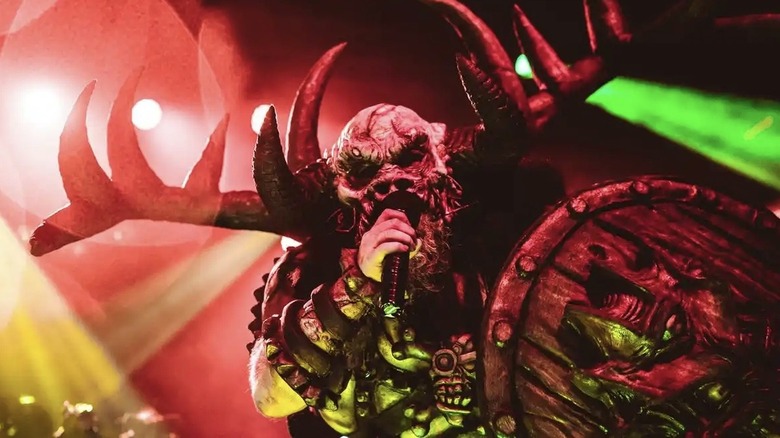
GWAR is a unique, beautiful, grotesque beast. The metal band was founded nearly 40 years ago in Richmond, Virginia, and while there have been a rotating lineup of artists throughout the band's wild history, Michael Bishop has been a part of it all since their debut album, "Hell-O." Originally, the bassist played Beefcake the Mighty in the band of barbaric space warriors. Nowadays, Bishop plays Blothar, the lead vocalist of the band.
The group's story is told in director Scott Barber's new movie, "This is GWAR," a metal tale full of highs and lows. The documentary is mostly a blast, though, celebrating the band's artistry and staying true to their creative roots throughout everything. There are countless stories we could've asked Bishop about during a recent interview, but mostly, we talked to him about his live experiences, including an unforgettable experience at Taco Land in San Antonio, Texas.
'The Craziest Show We Ever Did, I Think, Was Taco Land In San Antonio'

I saw you behind-the-scenes at Riot Fest this year getting the uniform on, and I think you just said, "Gotta make a living somehow."
Probably. Riot Fest is always fun. It's always a good time for us, and we've played it for 10 years or something. Yeah, and we had a big crowd this year, too. It was a good one.
GWAR is such a well-oiled machine now.
That's definitely true.
It's controlled chaos. But looking back, what were some of the crazier live experiences?
The craziest show we ever did, I think, was Taco Land in San Antonio, Texas, just a straight up Mexican restaurant. That completely insane show. Now GWAR is, like you said, a well-oiled machine and I wish we didn't have to have the barricades. I hate it. I hate being at a distance from the fans, especially when -- if there was ever a band that tried to tear down that distance, it was GWAR. In the same way, just like Iggy going out in the crowd and rubbing peanut butter on himself. GWAR taking what we do off of the stage and involving the audience, that's a big, important part of our aesthetic. It's a struggle to find ways to keep that aesthetic as the band plays bigger and bigger spaces, but we're trying.
What was so special about that Taco Land performance?
Everything, man. It was bananas ... The club, actually, is pretty famous in punk rock circles. There was a guy there named Ram, who was a Mexican guy who ran the club, and mostly what the audience was that night were migrant farm workers. As a matter of fact, when they saw what we were bringing in, all of the props and costumes, the people that were there called their friends. So all of a sudden the place was packed, a sold-out level of migrant farm workers and their ladies just having a blast. It was GWAR playing for people who had no idea or context for it at all.
Ram turned it into a private party for him and these people, his buddies, and the punk rockers were all outside in the courtyard, looking in. It was a bananas show. It was literally like a saloon brawl in the movies, where heads are tilted back and booze is getting poured down people's throats and tops are popping off. [laughs] It was like somebody had checked this button that said, "You can do whatever the hell you want. There you go." It was completely nuts.
People know what to expect from a GWAR show now, but do you ever miss the days when a lot of the audience had no idea what they were about to experience?
I do. I really do. It's one of the things that has driven us to try to take GWAR into new markets, too, because very few people really get what GWAR is doing in, for instance, Asia or Latin America. We've never gone down there and really done very much stuff, or even in Europe, parts of Europe that GWAR has never been in. Yeah, man, that's the biggest thrill about doing this: Watching the band reorganize what people thought was possible and permissible in performance.
'Luckily, We Manage To Still Find Things To Argue About So We Can Bring In Those Contrasting Visions'

What other parts of the world have you found the band really resonates in when you go overseas, where people really get it?
England gets it pretty well, and you don't have the language barrier. The shows become a little bit more mimetic, for lack of a better term, when we play in Europe and there is a language barrier. We're more relying on the visuals rather than the narrative of the stories that we tell -- although we've gotten really good at these narratives lately. Hopefully, that'll translate when we play. But I think Germany, always really good for GWAR. Great Britain, always really good for Gwar. For a while, we did really well in Scandinavia and countries like Norway and Sweden. People really, really dug what we were doing. We haven't been back for a long time.
It's funny, because we always expected to really resonate in Japan, partly because Japan's culture was such an influence on the band, but we haven't seen that happen very much. We haven't really tried. We only went once, but we are looking forward to it. I will say also that when we played in Mexico City, that was bananas, man. We're going to do that again this year, and that's an interesting crowd because they know what GWAR is in South America. They know what to expect. They just have never gotten to see it, so that's really cool. We have a lot of fans down there. We get a lot of mail from them and we've never been able to go down to Brazil or any place like that. Now, the band is in a better position financially, and also organizationally, that I think we can actually start to do that stuff.
Based on the doc, the band has such a unified vision now, but it also seems like a lot of those creative clashes in the past led to great work.
You're right. You're absolutely right. Luckily, we manage to still find things to argue about so, we can bring in those contrasting visions. [Laughs]
Obviously, you've had your experience with the band, but watching the doc and hearing everyone else's experience, did it change your perception at all about certain chapters in the band's history?
Yeah, I will say that the filmmaking experience was a lot better than the ghostwriting experience. I've told a lot of stories to journalists and then had them just completely get it ass backwards, but Scott did a pretty good job of telling things the way they were and the way that they happened. I don't know whether it's the medium or what, but I didn't have too many complaints, as far as that went. It flattens things out a lot, because there's such little time. There's a lot of things that I remember as being a lot more dynamic. There was a lot more discussion or a lot more tension or a lot more angles that you can understand it from.
If I had to pick a particular event ... [it's] the central relationship between Hunter Jackson and Dave Brockie. Hunter comes off as kind of a villain in this because of his continued resentment of Dave, but I don't remember it that way. I remember the two of them having a lot of conflict, but also having a lot of mutual respect, without which none of this would've actually been possible. And so that story isn't really told, the ways that those guys actually got along. That's not a focus of the story.
The interview with Hunter at the end where he talks about the loss of Dave Brockie, it seemed like there had to be more there.
Yeah, I didn't like that. I didn't like that he comes off as just, "Yeah, he died. Big deal." That's not how he really feels. I don't think there's any love lost between them, but like I said, there was always a definite creative chemistry there, and without it, GWAR wouldn't have happened.
'If Anything, Mass Culture Eats High Culture For Breakfast'

I've spent a good amount of time in Richmond, but hearing how it was back in the day, it sounded like the Wild West at times.
Oh yeah. It definitely had that feel. Certainly when GWAR started, it was probably one of the most violent cities in America. It was a rugged place, and GWAR grew up in the abandoned spaces, the failures of the New South. That's what allowed us to get a foothold in some ways and have creative space to do some of what we did.
Why do you think that city continues to attract so many artists?
Well, you had an art school that was a very good art school and it had the reputation of being a good art school. There weren't a lot of really strong graphic arts, and especially commercial arts programs, that were at state schools at the time. VCU stood out and people from Northern Virginia and from the Washington DC area could go and get in-state tuition. You had these two big population bases, which is DC, and also the Virginia Beach area, which is one of the biggest cities in the country. Those two populations coming to this art school, there were just a lot of people that were interested in art and music in one place.
I think that's most of what that story is, and then also the fact that it is a very inexpensive city and a city that was not very hung up on rules because it was so poorly run. There was a lot of latitude there. I've talked before in the TED Talk and stuff about the idea of, this had happened across the country. The cities were emptying out during this time period, so whereas right now, real estate in downtown and cities costs a lot of money, back then, you couldn't get people to open businesses or to live there. There was a lot of room for us to move into these spaces and rent places that were cheap and make art and have night clubs and play music and do that stuff.
It's funny, by the way, the art the band loved, VCU just rejected. Now, those comics and all those influences the college looked down upon, it's mainstream. Has it been gratifying seeing that change in culture?
Well, they were wrong. They were always wrong. I can tell you, too, it was not the graphic arts and it was not the sculpture department that was that way. It was painting and printmaking that had their heads up their ass. It really shows you how much culture has changed, that in the early '80s right up until the '90s, you still had this idea that mass culture was not culture, and that's simply wrong. It's always been wrong. If anything, mass culture eats high culture for breakfast. They didn't know that. They were still protective of the position of the artist and the ideals of the artist and notions of art that we just disagreed with. I think GWAR was right in the long run, and VCU changed because they had to. That's what the world is.
Especially after the experience of the documentary, what are you most proud of now when it comes to GWAR?
It is the commitment that GWAR has to one another. That is an exceptional thing. There is nothing like GWAR. As an academic, I was very well-trained in looking for, "What's something like? What does this set of features resemble, historically?" There's very little that you can find that is what GWAR is, which is this cooperative artistic movement between artists and musicians to create something, and to create it with very little reward or remuneration.
What you're getting out of it, it always feels like service to one another in a way. I think that's unique. While there have always been egos and struggles, at the root of it, it's about the fact that we like each other and that we like the same things and we want to keep doing this art. It's just that commitment that we have. That's really what I'm most proud of and what I think is most unique about the band.
"This is GWAR" is now available on VOD, Digital, DVD, and Blu-ray, and it's currently streaming on Shudder.
Read this next: The 50 Best Documentaries You Can Watch On Netflix Right Now (July 2022)
The post GWAR's Michael Bishop on New Doc This is GWAR and a Wild Show at Taco Land [Exclusive Interview] appeared first on /Film.
0 Comments